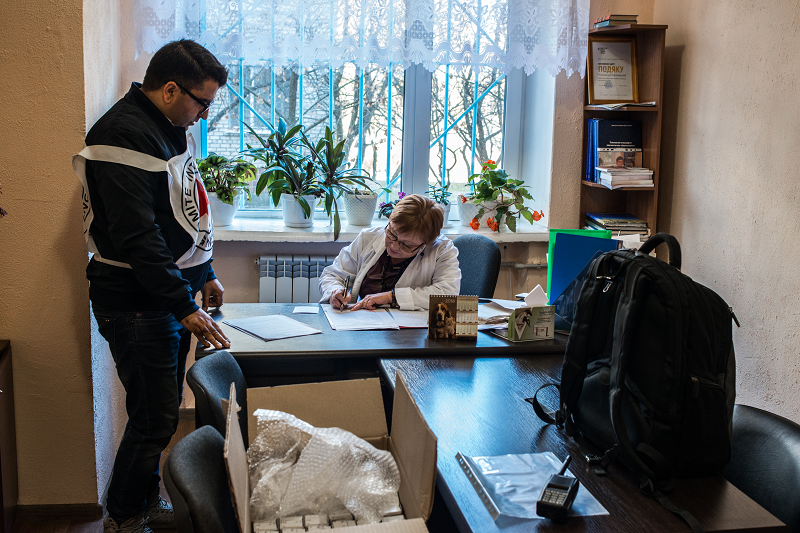Dr. Muzamil Nissar is the ICRC health field officer in Sievierodonetsk. He was only five years old when a conflict started in his homeland in Jammu and Kashmir. Seeing the suffering that conflicts bring to civilian people, Muzamil decided to become a doctor. He completed his post-graduate studies at the Lugansk State Medical University just a few years before the conflict started in Ukraine. He barely started working and, again, Dr Muzamil Nissar was in the epicenter of a conflict, as he had been in his childhood. However, Muzamil did not leave, and now, it is his 5th year of humanitarian work.
We talked with him about how he feels, having decided to stay and help people.
– What was decisive for you when you chose not to leave Lugansk and resorted to the life and work in a conflict zone?
I grew up in a place where a conflict has been going on for almost 32 years. From my childhood I saw how much suffering conflicts bring, leaving them without access to very basic things, for example. I also witnessed how aid workers, local and international, supported people in my homeland. It motivated me to stay when the conflict hit the Donbas.
I remember my discussion with friends about what to do. Only a handful of my close friends decided to stay, as it was a hard time for people. But we tried to support each other, we used to help elderly persons with household chores. We brought water for them and some other essential items like medications, as everyone was out of money. Indeed, I was also strapped, but it was my decision to stay, and try to help as much as I could. I was happy thinking that I was doing something good.
– What is the most difficult thing in your work?
What is really difficult is to accept that sometimes we cannot help everyone, and it is not easy to explain it to someone in need. For instance, we get some requests from beneficiaries, who are suffering from cancer, and we cannot support them individually. We do support all hospitals in our area, as well as the regional cancer hospital, and we know it is of benefit for many.
Besides, we are working along the contact line in a dangerous zone and, of course, tragedies do happen here, and it takes me back to my childhood. For example, when I visit one of our locations, which is near a broken bridge in Stanytsia Luhanska, where the ICRC supports the first aid point and the heating point, it reminds me of my school years, when the bridge near my home was burned. It was the only way to my school. Somehow, local people managed to construct a one-way walking bridge. And I remember that river, which could be crossed by jumping from one cemented pole to another, while holding the hand of my father. It was a daily walk hundreds of meters long. Sometimes, it makes me think that life is full of dangers like that river. You go on at the risk of falling, helping others, but you go, you live…
– What was then a rewarding part of your job?
The most pleasant and joyful part of the work is when I see smiles on the faces of our beneficiaries and the warm welcome and goodbye with a silent invitation to visit again. Sometimes we hug, or I get a warm handshake from the people, whose hands are trembling due to fear that they might be forgotten. To be able to bring them some hope – that is the most precious reward, which one can get in the world. There is a saying that Hope is a rope of life.
– Did your family accept your choice?
Before the conflict in the Donbas, I was doing well and my family was very happy as I had settled in. When the conflict started, I did not tell them anything at first. But very soon, international media informed about it and I got a call from my parents, asking me to come back home with a trembling voice. I had a long discussion with my father. I told him that I have a purpose here: to try to help the people in need. He understood me and accepted my choice to be a part of the humanitarian world.
A year ago, I got married. I explained to my wife, who is also coming from my homeland that I was and would be a humanitarian aid worker, as long as I could. Since she also grew up in a conflict zone, for her it was easy to understand the enormous needs during the conflict. What I liked was her phrase: “If everyone stays at home, there will be no humanitarian workers, so, if not you, then who?”
One day I want to come back home and continue my humanitarian path to help as many people as possible, but now I am needed here.
Your son was born recently. Did it change your attitude to work?
After the birth of my son, I started to perceive everything differently. This is a new responsibility and a new role for me. At the same time, it has contributed to my motivation as well.
I have worked in hotspots and been under fire, but as long as people who need help live there, I will do what I can to help them.
*A bone to a dog is not charity,
the charity is the bone shared with the dog when you are hungry as the dog.



